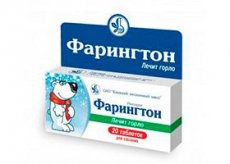Medical expert of the article
New publications
Preparations
Farington
Last reviewed: 23.04.2024

All iLive content is medically reviewed or fact checked to ensure as much factual accuracy as possible.
We have strict sourcing guidelines and only link to reputable media sites, academic research institutions and, whenever possible, medically peer reviewed studies. Note that the numbers in parentheses ([1], [2], etc.) are clickable links to these studies.
If you feel that any of our content is inaccurate, out-of-date, or otherwise questionable, please select it and press Ctrl + Enter.

Farington is a local antiseptic with antioxidant and antimicrobial properties.
Release form
Produced in the form of tablets, which must be resorbed, on blister plates No. 10. One package contains 2 blisters.
 [8]
[8]
Pharmacodynamics
The active substance of the drug is chlorhexidine, which has a bactericidal effect on gram-negative and gram-positive microbes (such as Str. Mutans, anaerobes, Str. Salvarius, Klebsiella, Str. Sanquis, Proteus, E.coli, Pseudomonas aeruginosa, Veillonella species, and Selenomonas ), and in addition it prevents the growth of candida fungi, as well as individual mold fungi. This substance blocks the development of protein amino groups that enter the structure of cytolemmas. It seeps into the cells of microbes and is embedded in membranes, changing its functioning, settling on the cytoplasm, thereby interfering with the penetration of oxygen. This causes a deficiency of ATP, as a result of which pathogenic microorganisms are destroyed.
Ascorbic acid helps to remove mucus edema, increases the activity of local immunity, and also participates in the process of collagen and tissue repair.
Pharmacokinetics
Chlorhexidine is not absorbed into the gastrointestinal tract or by mucous membranes. Approximately 10% of the substance is cleaved in the liver, and the residue is excreted together with the feces in unchanged form.
Ascorbic acid is well absorbed into the digestive tract. The binding with plasma proteins is 25%. In the process of metabolism is converted into dihydroascorbic and ethadic acids. Then it is excreted from the body together with the urine.
Dosing and administration
The medicine must be resorbed while holding in the mouth. Admission is required after eating or cleaning the oral cavity - this is necessary in order for the drug to remain in the mucosa for 2 hours without risk of being washed away.
You need to use 1 table. Four times a day. The treatment course is 7 days. Prolong the treatment can be a maximum of 2 weeks.
Use Farington during pregnancy
Studies on the use of chlorhexidine in pregnant women have not been conducted, and as a result of experiments conducted in mice, a negative effect on the fetus was not detected. Therefore, before use, consultation with a physician is necessary.
Side effects Farington
In general, the drug is well tolerated by patients, but sometimes there may be some allergic reactions, manifested as a rash on the skin and its ejection, nasal congestion, and swelling of the parotid salivary glands.
In some cases, the functioning of taste buds may be disrupted, which is of a transient nature, and stains and plaque can be observed on the fillings and enamel of the teeth. Occasionally, there are signs of inflammation, indigestion and irritation of oral mucous membranes. Under the influence of Ponso 4R, people with intolerance may experience allergies.
Storage conditions
Keep the medicine at a temperature of not more than 25 degrees.
Shelf life
Pharington is allowed to be used for 2 years from the date of manufacture of the medicine.

Attention!
To simplify the perception of information, this instruction for use of the drug "Farington" translated and presented in a special form on the basis of the official instructions for medical use of the drug. Before use read the annotation that came directly to medicines.
Description provided for informational purposes and is not a guide to self-healing. The need for this drug, the purpose of the treatment regimen, methods and dose of the drug is determined solely by the attending physician. Self-medication is dangerous for your health.

